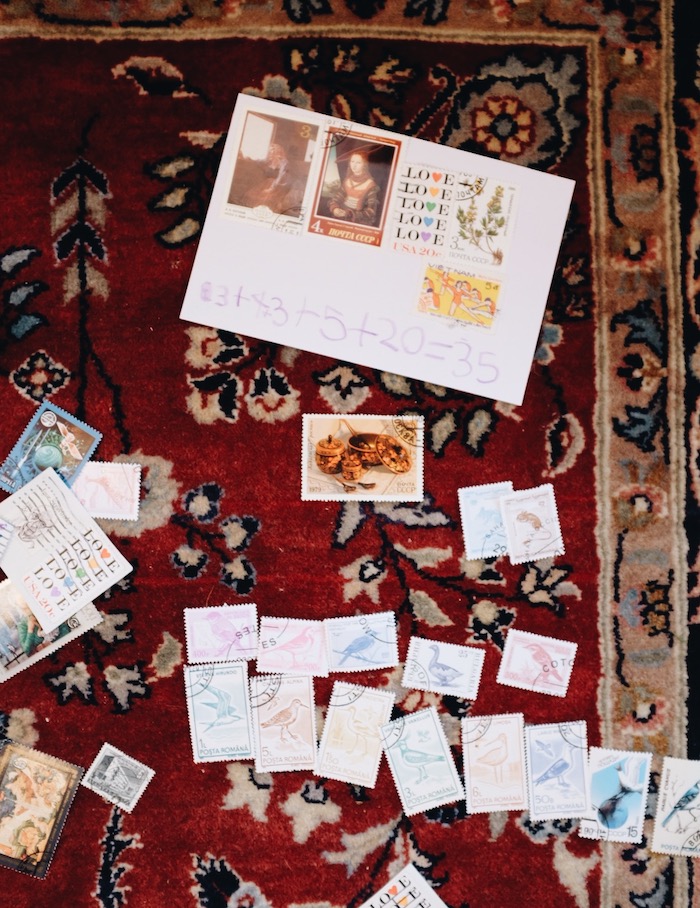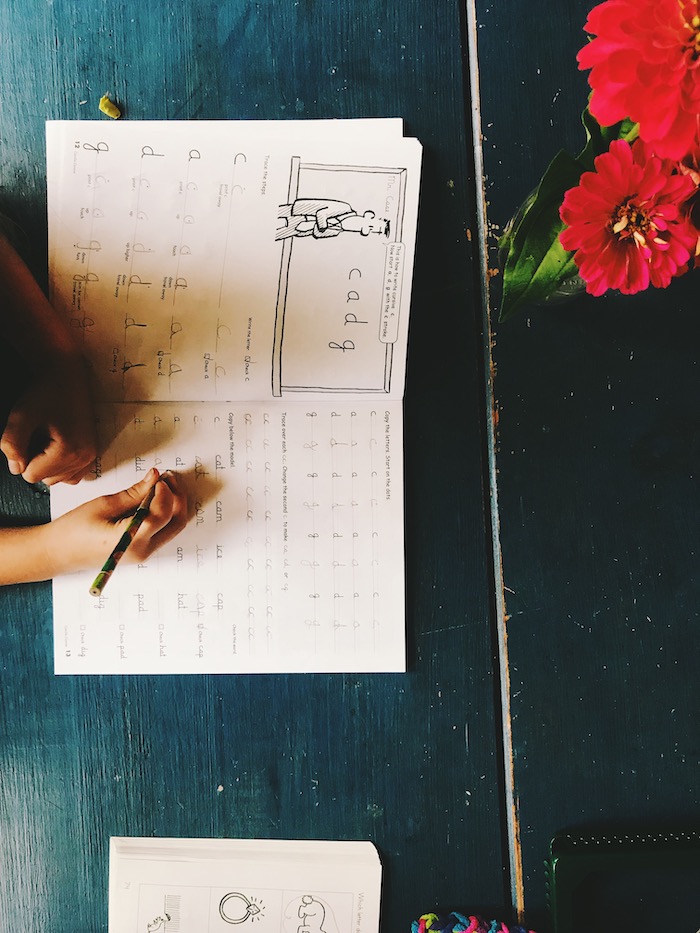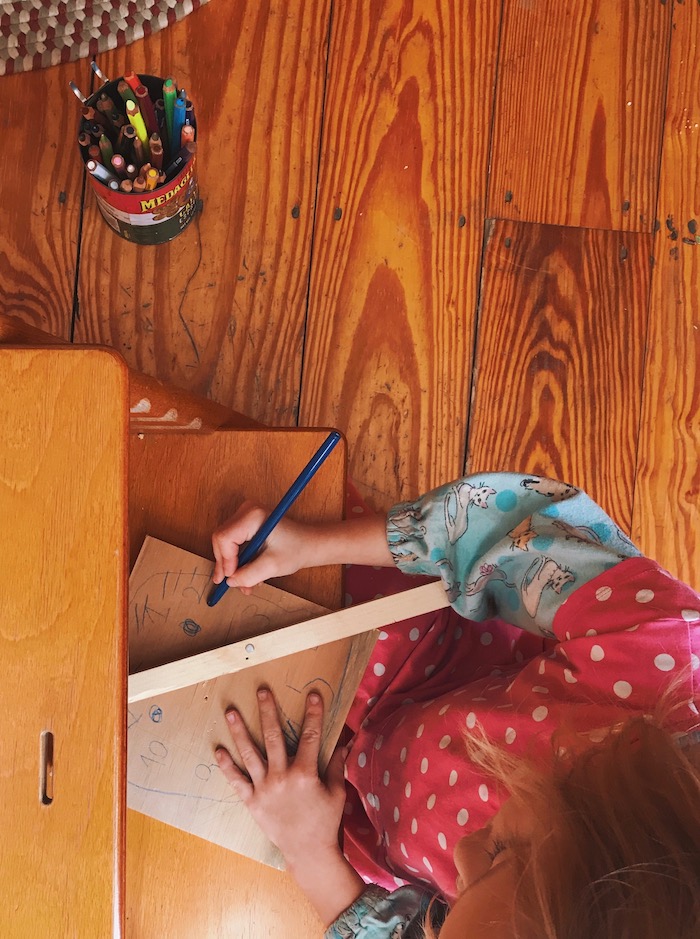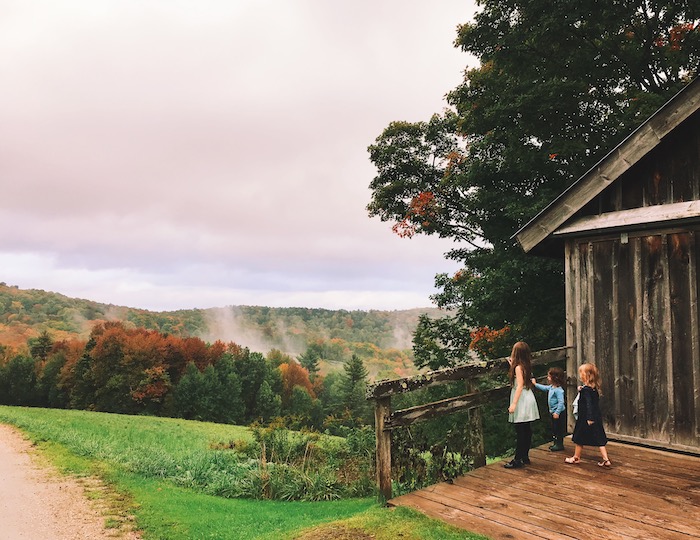Homeschooling, the first round

I’m writing from a sunny window spot looking out on sparkling fields of snow. After the snow fell over the weekend it was blown into pillowy drifts, and like clouds, they look like you could cushion yourself gently upon them for a sunny catnap. But they are composed of such light, dry snow particles that if you were to try, you would fall deep within their frozen burrows. It’s hard to imagine the ground ever emerging from such a generous sugary frosting.
It’s 2 pm, we’ve finished school for the day and I’m feeling content with all the work that was done, and also entirely weary of answering and asking questions. These things come together, in my experience. A memory of saying “And where is Damascus?” while one of the girls removed her nightgown and tied it around her shoulders like a cape, softly repeating my question as she gazed past the map and at the wall comes to mind. I want to be caught in my own mental energy for a while and maybe read the twitter feed of a food critic or possibly a new entry from a very bright and satisfied lifestyle blogger. The girls clearly feel the same way and are playing with marbles. I can hear them asking each other questions like, “Do you want Fuzzy’s name to be Sally?” and “Can we please go play with our dolls now?” Now the older two have agreed to a plan and rushed upstairs, and the youngest can at last chatter to herself with play uninterrupted.
It’s a little funny to answer questions about homeschooling when we’ve only been doing it for a few months. That, combined with our recent lifestyle change–living in a new state and new house–in essence, I’m radioing back trail updates from just a few steps down the path.
Homeschool is a strange adaption in an ever-changing world. It doesn’t make sense in any practical way to educate children separately from their peers. Certainly, it would far easier to have them all grouped together in a classroom watching the same lectern.
At yet there is always something appealing about it. The slow pace. The diversified interests. The magnified attention to the desires of the child’s heart and mind. The way the parent can walk the path alongside their child, instead of waving encouragingly from the sidelines.
It was a treat to read through all the questions I received on Instagram about homeschooling so far. I would like to write a longer post about how our day looks and what I’ve learned, but I thought these questions summed up their own sort of logic and I want to be sure to answer them clearly. It’s important to say I’m not trying to sell you on anything. Your reasons for this sounding like a good or bad idea are entirely up to you, your family, and perhaps most importantly: what your family needs this year.
If questions seemed to be in a similar vein, I grouped them together with a //.
Curious to know your “why.” We’ve homeschooled from the beginning and I love hearing what people’s vision is for homeschooling.
The decision came about at the same time that we were looking at changing our lifestyle–moving into a quieter part of the country and adapting Joe’s daily work to less traditional hours. We had a sudden strange craving for daily chores of a different sort–housekeeping, gardening, land management.
I think our biggest why was to reclaim the time and their childhood. We imagined we could give them hours of boredom and wandering. We hoped to see them comfortable in nature. We wanted them to be able to stay up late reading and sleep in beyond 7 am the next morning. We wanted them to play together for hours with elaborate imaginary games. We wanted them to have no idea that the things they were excited about were unique and different.
As parents, we wanted the luxury of planning long weekends and adventures for all three of the kids, without worrying we were disrupting class schedules or commitments.
I think when we signed up for formal schooling, we thought we could say yes to all of that, plus school, but eight hours is a long time to be away. You get your kid back and they’re worn out and tired. They can barely answer your questions about what they learned. And the year goes by–in a blink!
How has the transition been from public school to homeschooling? Our oldest is in public kindergarten, but homeschooling has been on my heart for some time now.
The transition is likely most disruptive for parents. It feels great not to hassle your kid about turning out the reading light because she doesn’t have to wake up at 6 am. It feels great to have breakfast together and do the dishes and tidy the living room together. It feels amazing to know what topics they are excited about and how to help them learn more about them.
But it can feel odd to not have the whole day regimented. It can feel like you’re not doing “enough” because you haven’t directed every moment of their mental energy. It can feel odd to find them gazing out the window in contemplation. It can feel like a personal attack when they don’t want to sit down and get work done together every single day.

I’d love to know how much time you spend on schoolwork, and what the girls think of it – especially Lux, since she went to a brick and mortar school for a bit.
We spend about three hours on schoolwork a day. There is some reading aloud and tons of (voluntary!) reading alone time in addition to that, but I like to be done with most of the group and individual work by lunchtime, if we begin around nine.
They seem to love it. If they were asking to do something else, we’d likely be doing it!
Lux was originally tempted into homeschool by observing the material her younger sister was learning through Classical Conversations when Lux was going to public school. We noticed she was very engaged in the material and often asked to study with Joan. On the mornings when she would ask to stay home, we would say she was welcome to homeschool next year if that was what she wanted. And she often said, “yes! That’s what I want.”
Lux remembers school very fondly and is nostalgic for aspects of it. Occasionally she will make remarks that reveal how loud and chaotic she found it, how the waiting and lining up was frustrating, how repetitive the reading material was and how that bored her. (These are things she either couldn’t articulate or simply never mentioned at the time.)
The things I remember are how little ownership she felt over any projects completed in class, how she was gone the whole day and couldn’t manage to get along with her sisters when she got home though I could see how badly she wanted to, and the general sense of edge-softening/dulling that seemed to happen to her unique curiosities and spirit.

I’d love to know what you’re using, what your days look like, and how you balance school with the little ones!!
We are using :
-Classical Conversations: “CC” A weekly group meet up with a memorized curriculum in seven subjects, science experiments, and fine art experiences.
-Sonlight Curriculum’s history & literature (about an hour of reading per day lined up for the entire year, 3-4 different books daily). This curriculum has a Christian emphasis but most of the titles are not specifically religious.
–Handwriting Without Tears cursive (love the style of these books!)
–Explode the Code phonics (Joan adores these)
-Life of Fred math & everyday math engagement with things like postage stamps and road signs
The newly three-year-old would be the first to tell you she does school. In fact at the doctor’s office when they asked her what was one of her favorite things to do, she said “phonics!”
But really, the morning school hours can be boring for her, and she has to learn to be as least disruptive during this time as she can. It is amazing/delightful to see how much of the material she will engage with. She’ll ask what a word I just read aloud means. She’ll attempt to and sometimes successfully memorize the same material as the girls (a two-year-old singing Latin declensions is unbelievably cute).
She has her own books, crayons, notepad, and letters that come out during this time. None of them catch her attention for long…which is totally normal for that age and I don’t get discouraged by it.
And after each morning session, I gush over how patient she was, and we get a stack of books and read them together, just she and I. Then too her sisters have hours of the day after lunch to play with her and include her in their games—what could be more amazing?
Are you still able to do CC in Vermont and if so how is it going? We started it with my 4 and 6-year-old when we moved to Florida.
Yes! For each house we looked at while house hunting, I used the zip code check to see what CC was in the area, and often reached out to the leader to talk and ask questions about the town and community.
It didn’t determine where we purchased a house, but I would have been surprised/concerned if there hadn’t been a community within 45 minutes.
I know so little about homeschooling, so I’d love to find out how you homeschool three different ages at once. // It interests me so much but I don’t know much about it. Would love the basics including how you handle 3 different ages.
The primary approach with the reading is one-room-schoolhouse style. I read books aloud that the seven-year-old could theoretically read aloud to herself (though she would avoid them because they appear boring) and that the five-year-old may understand most but not all of the material therein. Sonlight Curriculum makes this easy by shipping you a box of books for those ages and laying out the schedule for the year.
But one shouldn’t think they have to pay lots of money to do this kind of thing. There are lots of free programs laid out online and you could compose it with library books and used book purchases in advance. Ambleside Online is a good place to encounter this world.
For CC, the girls memorize the exact same material. The older child is likely grasping the geography of ancient Mesopotamia in a more concrete way than the younger child. And it’s a little easier for her. But they both work at the same thing.
Handwriting, phonics, and math are individualized to their exact level. It takes us about 15-30 minutes with each to do each subject.

Do you have any suggested reading for those who don’t homeschool but would like supplement with the classical model?
You might enjoy purchasing Classical Conversation’s CDs for the car. Begin with the history sentence songs and see what your children think. I guess they would likely eat it up, and ask you to play it again and again. The Story of the World is also a wonderful book & audiobook (there are four volumes) that can enrich any daily life with history.
Another way to experiment with the Classical Conversations material is to download their app for this year’s cycle C1 (I can’t recommend other cycles as I think they have not been updated). My girls love this on their iPads and they casually review, I’m not making this up, 12 weeks of material in one trip to Boston. Excellent ancient world geography graphics here too.
Geography is a big part of classical education, so I have one more app to recommend: National Giraffic. It’s tough but excellent and fun! I think ages six and above for this one.
I’d love to know more about how to pick a curriculum… And yes, also more about balancing homeschool with multiple ages (my kids are 7 and 3).
This is a tough one because it has so much to do with your preference for emphasis and your child’s interests. If you know anyone homeschooling, you can begin to ask around and learn that way. Check what CC group is in your area (see above for the zip code link), email them and ask to visit and observe a meeting for a day—what’s the harm? I had heard of Classical Conversations for at least a year before I checked it out, and I was originally not interested. Then because it was for my four-year-old, and I had little to lose, I decided to just try it. I wish that I had just looked into it earlier, instead of steering around it.
Sonlight Curriculum’s website and the catalog does a great job of reviewing lots of curriculums for math, handwriting, phonics etc. Click around their language arts section and just see what appeals to you. After that google the names, and you’ll likely find homeschool bloggers talking about why they like it.
I got to see Sonlight Curriculum’s reading style growing up because my mom did it with my little brothers, which is why it was familiar and appealed to me.
For me, her approach was more of an unschooling style, plus I couldn’t grasp reading until “late,” around nine-years-old. Once I could read I embarked on my own curriculum of reading everything I could get my hands on, for hours every day.
The vintage book I review here might be an interesting armchair read for you. It goes into how she organically found a curriculum of sorts and how it morphed over the years.
Do you plan on sending them to a traditional school when they’re older?
I think so. I’d be surprised if we were still homeschooling after middle school. Perhaps if an alternative path became tempting to them—like if one of them wanted to go to culinary school, live abroad, become an engineer, and wanted to complete high school on the side.
As a kid I was homeschooled, transitioned to high school, and though I feel like those years had a lot of wasted time sitting in classrooms, I also loved the sports, theater experience, and close friends that came out of that time.

Do you feel pulled in lots of different directions? I feel nutso helping my 11, 9, and 6 year olds with homework after school with the 3 yr old cruising around…in my head I multiply that painful 1.5 hour of the day to equal a day of homeschool ? my kids beg to homeschool (their cousins do, and so does our babysitter) but I’m also worried I’d let a lot of things slide under the guise of “relaxed” schooling or “unschooling” or “guided learning.” I guess my question is…how do you be the only adult in charge and stay that way?? ?
Keep in mind you are dealing with your kids after they’ve already had a totally exhausting day at school. Energy is low. Attention span is even lower. Interest level in the topics…probably all time lowest. Deep in their minds, they are processing all the social interactions and moments they had, whether to bring them up to you, what they meant, wait why did that happen, etc.
I’m reading things aloud that the girls say, “please keep reading!” when I’m done. They are proud of their memorization skills. I get to see them have the “aha!” moment with topics and work through them. Yes, it’s for sure distracting to them when the three-year-old interrupts every seven minutes with a random question.
Your older two would probably have quite a bit of solo work that they would be responsible to complete on their own (and could probably do in 15-20 minutes what would typically take a classroom “hour.”). The Unlikely Homeschool could be a good resource for you here—I’m not as sure about what the great curriculums are for those ages.
And you likely would have things that felt relaxed to you! Because as soon as a kid is interested in something (and they are able to read), they can often take it from there. That would feel easy, but in fact, you’d be watching as they took an interest and turned it into a passion, conquered it, and picked a new one.
Wondering how Lux is feeling about homeschooling after being in public school; and whether any of your daughters are extroverts, and if so, how you meet their need to gab & interact with lots of people all the time. (We’re thinking about homeschooling our kindergartener once the school year is over and these two issues are heavy on my mind!) // Do you feel like your children are getting enough “socialization” at home? Is that ever a worry for you? My husband and I are both introverts and I feel like our daughter is very extroverted, but I also feel like I was extroverted as a child, but a lot of school experiences made me more shy and introverted. I sometimes feel like I’m depriving her of socialization just because we would rather take a walk around the neighborhood as a family or go for a hike than spend the day with other families, even if she does seem perfectly content with these activities.
Yes, the oldest is an extrovert. That aspect of her is something I’m very sensitive to, and as a mom, I go a little out of my way to make sure she gets engagement. Whether it’s paying special attention to her request to take a class, a play date that takes some planning to make happen, potlucks, church Sunday school, willingly signing her up for sleepover camp, and just keeping tabs on how she’s doing.
In general, I don’t believe traditional school offers the unstructured social time extroverted children crave. I also don’t believe children need as much peer socialization as is often implied.
What’s working?! I feel like it changes a lot and sometimes my “philosophy” has to bend a little to make the day go smoothly.
What’s working for me right now is to strive not to take it for granted. Life feels brief, childhood feels even briefer. There are lots of moments that would feel easy to shrug at–giggling at Winnie-the-Pooh’s old fashioned language together, the girls reading to each other on the couch, cheerfully playing each other’s games with absurd rules, widening their eyes with curiosity at a new idea or topic, finding a new favorite aisle of the library to settle in for an hour.
These are in fact moments that are absolutely unique to a very short period of life.
all of the above and how you self care? really looking forward to this post ?
Once I decided that 3-4 hours was sufficient for what we wanted to accomplish each day, I became pretty clear that my on-call time was done after that. At lunch, I’ll say, “what will you guys do this afternoon?” If I’m reading or writing and they keep (joyfully, no doubt) coming up to me with various remarks, I’ll tell them it’s distracting and I want to be left alone for a while.
If I’m doing any kind of housekeeping, I try to make sure they are aware of what’s going on and are asked to help however they can.
When I first considered homeschooling, I had a secret theory that most moms doing it had a hack that was helping them. A husband with a flexible schedule. A mother-in-law down the street. A house cleaner. A babysitter for a few hours a day prepping dinner and playing card games. (I mention this survival theory in my review of this book.)
And for the most part, I’ve found this theory to be proven true. My hack is that Joe is now working from home. And though he disappears into his office for hours at a time, he is still an adult presence in the vicinity and this goes a long way. He can stop by when I’m prepping dinner and chat for a few minutes. He eats lunch with us and quizzes the girls about their morning. He can stay with a sleeping baby if I run out to do errands with the other two. These little things help a lot.
Admittedly, I’m not getting ninety minutes of silence every day. I’m not even getting sixty minutes of silence. It’s a phases of life thing. Cuddling kids on the couch and read books. Hear their creative story unfold as they quietly talk to their toys. Wake up slowly and make pancakes. Put my feet in front of the fire and say, “wow I did that today.” Feel totally normal sprawled on the library floor playing Candy Land with all the wrong rules. Spend an afternoon worrying over a random fever and questioning a nurse closely over the phone. I get those things.
Like so many aspects of motherhood, the decision to homeschool can immediately become burdened with guilt. It’s all on me and I’m not doing enough crop up frequently. Signing up for too much and feeling like a failure when you can’t pull it off. Giving up as a result. It’s very important to avoid this for one big reason: If you are providing consistency and respecting the level of interest your child is at, it’s very difficult to screw this up. Honestly. The child’s innate curiosity and drive will win out.
Thank you! Lots of love.
16 Comments
Kelly
Thanks so much for this post, I’ve been looking forward to it ever since you asked for questions on Instagram! I’d love to know (as I’m also expecting a new addition to the family shortly) what your plans are for when the baby arrives?!x
Rachael
Well I think like any time we’re expecting a new little one–lower the standards and be kind to ourselves! With the schedule as minimal as I’ve already made it, I don’t think it will be too much to pull off. I also can’t imagine not doing any formal learning during the summer, so if spring is mud play and fort building, June can be handwriting yet. : )
Helen
Fabulous post I saved for reading today (blizzard!) with a cup of tea. Thank you so much for your illuminating answers to our questions. Eager to watch and learn more as this family journey of yours unfolds.
Cynthia
Wow, I’m blown away by your wisdom and attitude. This is one of the best treatises on homeschooling I’ve read. I have no doubt your children are enjoying a wonderful life and reveling in day after day of learning, playing, creating, and being in the comfort of home with parents they adore. I hope you inspire many, many folks to join you. You are part of creating a better world.
Rachael
Oh,thank you! I have a lot of benefit from having grown up with a mother who loved homeschooling and believed the power of the child’s innate drive.
Danielle
I really enjoyed this! We have girls of similar ages and also homeschool. I can relate to a lot of your reasons for wanting to and also the needing just a minute to take a beat after the school part of the day is done. My oldest was in traditional school for a bit and I would say that only about 10% of her day was spent learning and she was also very frustrated/confused at the behavior of some of her peers. Still not sure if we’ll continue this next hear but I have really enjoyed this time learning along with them!
Rachael
year by year!
Casey
Thank you! I would echo the commenter question about plans for homeschooling with your coming babe—any thoughts as of yet? Our son is at a classical preschool, where my husband teaches and is an administrator. I have loved the introduction to the classical world through both of them, especially classical conversations and a few of the materials you mentioned above. I have some desire to keep him there for kindergarten next year (he’s struggled with separation anxiety, even with minimal separation and I’ve felt it important he can stand safely on his own, too), though I long to have that slow-paced learning style you describe. We met with a homeschool counselor last week, and I’m more conflicted than ever. I should mention my son is the eldest of soon-to-be four. While I would love nothing more than to walk that path, I’m not sure I can swing it with the gaggle of littles in the mix (3 and 1.5). I’m nearly 100% sure I’m overthinking it too. Whatever the case, this picture window into your reasoning, thoughts and hopes comes as a timely consideration for me. Not sure exactly what steps I’ll take, but certainly celebrating yours! Eager to hear more as it develops.
Rachael
It’s a good stage to be in where you’re not ready to take the plunge, but you’re watching and thinking about what it would look like. I learned a lot in that stage, and it’s important (as you’re doing) to count the blessings of what you’ve currently decided as there are certainly things you’ll miss about it someday!
Noelle
I enjoyed reading this more than insta-anything, thank you for taking the time to write it. We always start our homeschool days after lunch, but *before* lunch sounds sooo much better, going to try that starting tomorrow.
p.s. I owe you snail mail.
Mary
I agree with the above commentator, that this is an excellent treatise on home education. I am right there with you on all of it. We have similar aged children and I love that homeschooling allows their childhood to be slower, more exploratory, and full of lots of reading together. One of the greatest benefits I have found is all the time together, though sometimes that seems like a hard aspect too. It3good for us though. I so admire your philosophy and methods here and wish you all the best for the year ahead.
Liz
A book Alma might enjoy is Alma and How She Got her Name by Juana Martinez-Neal, which just snagged a Caldecott Honor. 🙂
Rachael
Thank you! I keep seeing it at the library but also avoiding it…I’ll pick it up next time!
Emily
This is fascinating and beautifully written, as always. Thanks for answering my question – and all of the many others – with such insight and detail. I’ll look forward to more of these in the future as your homeschooling practice grows and evolves!
Kathryn
Thoroughly enjoyed reading this! I was homeschooled through 5th grade and sort of took for granted how much I learned and how much time I had leftover for imagination, reading, and extracurriculars. Now that I’m a mom, I’m realizing how much work it could be to educate my kids at home and I’m in awe of my own mom! In hindsight I’m extremely grateful for the foundation that homeschooling gave me and I think most of the joys of my childhood are linked to that time.
Rachael
Such a nice summary of your memories, thank you!